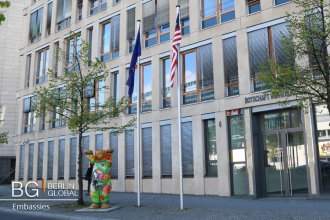 |
The Embassy of Malaysia in Berlin |
Contact

Address: Klingelhoefer Strasse 6, 10785 Berlin, Germany
Tel.: +49 (0) 30 88 57 49-0
Fax: +49-(0) 30-88 57 49 50
+49-(0) 30-88 57 49 55
E-mail: mwberlin@malemb.de
www.kln.gov.my/web/deu_berlin/home
The Ambassador
H.E. Dr. Adina Binti Kamarudin
H.E. Dr. Adina Binti Kamarudin was born on the 24th of April, 1971, in Selangor and has a rich academic background complementing her esteemed career. Dr. Adina's pursuit of knowledge led her to earn a Doctor of Philosophy in Law in 2018 from the National University of Malaysia. Before this, she attained a Diploma in Public Administration from the National Institute of Public Administration, Kuala Lumpur, in 2001. Her legal foundation was laid with a Master of Laws in International Law in 1995 and a Bachelor of Laws with Honors in 1994, both from the University of Wales, Cardiff. Her academic achievements have provided a strong underpinning for her notable contributions to international law and diplomacy.
Her experiences abroad included a stint at the 55th United Nations General Assembly (UNGA) as Long-Term Delegate (LTD) in 2000, a member of the team which established the Malaysian Embassy in Dublin (November 2001) and the Consul General of Malaysia in Frankfurt from 2104 to 2017.
She then assumed the post of Deputy Director General of the Maritime Department before subsequently becoming the Director General of the department. The Department handles issues relating to maritime boundaries negotiations, South China Sea, maritime securities and maritime safety, UN related law of the sea issues, International Maritime Organisation (IMO), IORA and ASEAN related issues.
In her capacity as Director General of Maritime Affairs Department, Dr. Adina lead negotiations at technical and working group level for maritime boundary delimitation.
She was also the Head of Delegation for Malaysia for South China Sea negotiations on the Implementation of the Declaration of Conduct (DOC) and the Code of Conduct (COC) at the ASEAN – China Joint Working Group.
She received her appointment as the Ambassador of Malaysia to Germany from His Majesty the King on 2 December 2022. She subsequently presented her credentials to Federal President Frank-Walter Steinmeier on 8 February 2023.
Married with three children.
History
Political relations between Malaysia and Germany are based principally on the two countries’ intensive economic relations. Germany sees Malaysia as an important and stable partner in Southeast Asia and a leading member of ASEAN, and also as a prominent, moderate representative of the Islamic world. Germany acknowledges Malaysia’s role within the United Nations and its conciliatory regional stability policy (southern Thailand, southern Philippines, and South China Sea). Federal Chancellor Merkel met for the first time with the current Malaysian Prime Minister Najib (in office since April 2009) on the sidelines of the Washington Nuclear Security Summit in April 2010. She met with him again on the sidelines of the ASEM Summit in Brussels in September 2010 and most recently at the ASEM Summit in October 2014. Federal Foreign Minister Steinmeier met with his Malaysian counterpart Anifah most recently in June 2015 in Berlin.
Economic relations between Germany and Malaysia have for many years been very close and are an essential element in the good relationship between the two countries. The visit to Kuala Lumpur by Parliamentary State Secretary at the Federal Ministry for Economic Affairs and Energy Zypries in October 2015 has helped to further cement economic relations between the two countries. Joint bodies and institutions include the Malaysian-German Chamber of Commerce and Industry (established in 1992) and the German-Malaysian Institute, which is engaged in vocational training.
The principal economic accords between the two countries are the agreement on investment promotion and protection (1960), the air transport agreement (1968), the double taxation agreement (2010) and, at regional level, the cooperation agreement between the European Community and ASEAN (1980). The EU and Malaysia commenced negotiations on a free trade agreement in 2010.
Cultural cooperation between the two countries focuses on education and language work. Nearly 650 people are enrolled in the Goethe Institute Malaysia’s language courses. The Malaysian-German Society in Penang also offers German language courses.



